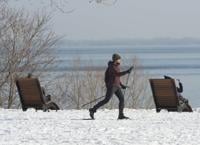MONTREAL - Two Montreal police officers were justified in stopping and searching a man after they became suspicious of his "man purse" and his behaviour, a Quebec court judge has found.
Police stopped Marcus Nimeri, 24, in October 2023 and found a loaded handgun that had been illegally modified in his shoulder bag.
But his lawyer, David Leclair argued the gun shouldn't have been admitted as evidence because police had no reason to stop Nimeri, who was committing no crime by wearing the small shoulder bag as he walked down a city street during the day.
But Quebec Court judge Dennis Galiatsatos wrote in his April 18 decision, that evidence presented during the trial demonstrated that such bags are often used to carry handguns.
"To dispel any ambiguity, police officers can — and should — certainly pay particular attention to man purses, in light of other evidence," he wrote, adding that such shoulder bags are "the ideal hiding place" and that criminals are more likely to carry their guns in such bags than tucked into their pants or at their ankles.
"Under the circumstances, if a police officer ignored a clue like this, it would be proof of nothing less than incompetence," Galiatsatos said.
Leclair had argued that his client had been profiled because shoulder bags like his are popular among men in the Black and Arab communities. Galiatsatos rejected that argument, saying no evidence was presented that the bag was linked to specific racialized communities.
"Certainly profiling suspects on the basis of their race, ethnic origin, religion, sex, apparent sexual orientation or membership in a marginalized social class is deplorable. However, according to the court, these principles don't apply to a class of fashion accessories," Galiatsatos found. "The category 'people with a satchel' is not a protected group and shouldn't become one."
Two police officers, Nicolas Boivin and Patrick Laleyan, testified that they noticed Nimeri at an intersection while they were stopped at a red light, Galiatsatos wrote. Their suspicions were raised when he saw them and quickly turned around and started walking the other way, moving the bag out of their view, according to the judgment.
The fact that he was carrying his cellphone in his pocket suggested something else was in the bag, the officers told the court, and the way he carried the bag was typical of someone carrying a gun.
Both officers testified that the majority of guns they had seized were carried in similar bags. Laleyan, who had been involved in 30 gun seizures, said the bags were so perfect for carrying a gun that he had used them when working in plain clothes.
Galiatsatos said there's nothing "reprehensible or problematic" about police officers considering the bags as one sign, among others, that someone could be carrying a gun.
Nimeri's behaviour both before and after police stopped him was suspicious enough to justify the search, which found the illegal gun, modified to shoot only in fully automatic mode, the judge found.
"The court finds that not only did constables Boivin and Laleyan have the right to search Nimeri's bag, they had to do it. They have the responsibility to protect the lives of members of the public, as well as their own," he wrote.
Galiatsatos found Nimeri guilty of possessing a loaded prohibited weapon, carrying a concealed weapon and obstructing a peace officer.
"If young men are unhappy with the attention that man purses attract from police officers, they just don't have to wear them," the judge wrote. "For decades men have done fine without man purses. There's nothing to fear: wallets still exist, as do pockets on pants and on coats, as well."
This report by Ďă¸ŰÁůşĎ˛ĘąŇĹĆ×ĘÁĎ was first published April 24, 2024.








































